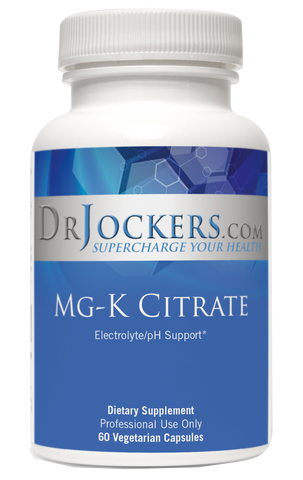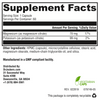
Mg-K Citrate™ provides two intracellular cations that are vital to maintaining healthy muscle contractility, nerve conduction, and blood pressure levels already within the normal range. - Dr. Jockers
Let's discuss the key benefits of Mg-K Citrate:
Why choose MG-K Citrate
Read our customer reviews and you'll see why our clients agree these are...
Supplements You Can
TRUST
Mg-K Citrate

What is MG-K Citrate?
Mg-K Citrate™ provides two intracellular cations that are vital to maintaining healthy muscle contractility, nerve conduction, and blood pressure levels already within the normal range. These minerals help maintain healthy electrolyte and acid-base balance and support kidney health and function.

What is the importance of Potassium?
Potassium is a vitally important mineral in the cell. Approximately 98 percent of the body's stores of potassium are within the cell. It is the ratio of intracellular-to-extracellular potassium that determines muscle cell excitability. Thus, potassium plays an essential role in the functioning of not only skeletal muscle but also the heart muscle.
Potassium is essential for nerve impulse transmission, muscle contractility, maintaining already normal blood pressure, energy production, and nucleic acid synthesis. Epidemiological evidence suggests that diets high in potassium provide numerous benefits to cardiovascular health.

Potassium Deficiencies
A potassium deficiency can occur when large amounts of potassium are lost via the digestive system or the urinary tract; for example, prolonged use of a non-potassium-sparing diuretic can cause a loss of potassium via the urinary tract.
Individuals with eating disorders are also at risk for being potassium-deficient. A chronic potassium deficiency can result in several adverse health conditions; at a minimum, a low potassium level can result in a prolonged feeling of weakness and fatigue.
Calcium Oxalate Kidney Stones
Potassium citrate helps prevent precipitates in the urine. In addition, potassium citrate is effective for alkalinizing the urine. Additionally, the citrate portion binds to oxalate crystals and helps remove them in the urine.
Elevated oxalates are associated with the most common form of kidney stones (calcium oxalate stones), chronic pain, headaches, and other common health complaints.

Magnesium
Magnesium, the fourth most abundant mineral in the body, participates in over 300 enzymatic reactions in nearly all tissues. Deficiency is common. The average American diet is thought to provide about 40% of the daily magnesium needed, and reports from the World Health Organization have suggested that three-quarters of American diets fall short of this amount (1).
Deficiency can result from poor dietary intake, poor absorption, and excessive losses through urine, stool, perspiration, or lactation. Because magnesium is predominantly an intracellular cation, serum magnesium levels remain a poor predictor of tissue magnesium content and availability (1).
What is the recommended dosage?
Normal Dosage: 1 capsule with each meal
Advanced Dosage: 2 capsules with each meal
When introducing a new supplement, we recommend taking the lowest dose for 2-3 days. As tolerated, increase the dose until you have reached the recommended normal or advanced guidelines. Reduce to a tolerable dosage if adverse effects occur.
STORAGE: Keep closed in a cool, dry place out of reach of children.
ALLERGY WARNING
This product is contraindicated in an individual with a history of hypersensitivity to any of its ingredients.
PREGNANCY
If pregnant, consult your healthcare practitioner before using this product.
INTERACTIONS
Aspirin, laxatives, sodium bicarbonate, and several prescription medications – including tri salicylate (a pain medication), colchicine, corticosteroids, and non-potassium sparing diuretics (such as thiazide diuretics) – can induce potassium depletion.
ACE inhibitors (captopril, enalapril, ramipril, etc.) can produce potassium retention by inhibiting aldosterone in the adrenal glands. Potassium supplementation concurrently with ACE inhibitors and potassium-sparing diuretics (spironolactone, amiloride, triamterene, etc.) should be undertaken with caution to prevent excessive potassium levels in the body.
FAQs:
What allergen does this product contain?
This product does not contain wheat, gluten, corn, yeast, soy, animal or dairy products, fish, shellfish, peanuts, tree nuts, eggs, ingredients derived from genetically modified organisms (GMOs), artificial colors, artificial sweeteners, or artificial preservatives.
Select Your Options & Add to Cart
† These statements have not been evaluated by the Food and Drug Administration.
This product is not intended to diagnose, treat, cure or prevent any disease.







